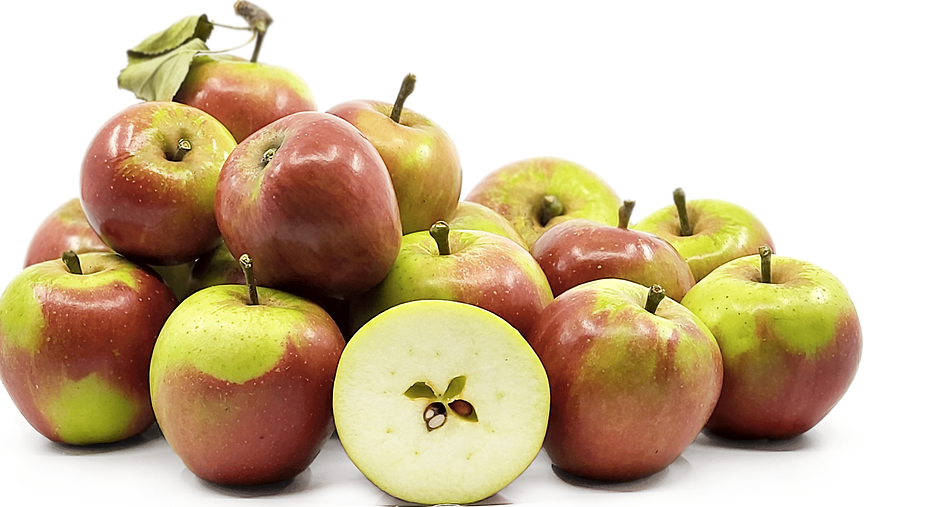Ambri Apple: A Forgotten Fruit
Ambri apple is an indigenous apple of Kashmir and was the most widely cultivated variety till about 1960's
Post by WASEEM AHMAD on Wednesday, October 25, 2023

Ambri apples have historically been grown in Kashmir, particularly in Shopian, and had a distinctive position in the world for producing a particular variety of apple called “Ambri”. The Ambri apple is an attractive variety with a distinctively oblong/conical shape, often flattened at the base. Some fruits also have some ribbing. Ambri apples are medium to large in size, and the skin of this variety has a reddish pink blush and smearing striping overlaid on a greenish-yellow background. The Ambri apple’s white flesh is creamy, crispy, aromatic, and sweet. Ambri apple trees are fairly vigorous, tall, and broad. The trees produce a large number of fruits.
The apple variety is appealing with a high keeping quality and is chosen for its sweet taste, crispness and fragrance. The apple variety had secured a safe position in the valley, as it was well suited to the agro-climatic conditions. Dodhi Ambri, Kishtwar Ambri, Chari Ambri, Walayati-Amberi and Mah-Ambri were among the few Ambri cultivars that were common and commercially cultivated by the grower in the valley.
Ambri apple is an indigenous apple of Kashmir and was the most widely cultivated variety till about 1960's, when some imported and highly commercialized advanced substitute varieties of apple trees were introduced in Kashmir. Ambri apples begin to get pulled off from orchards because of many drawbacks like, low yield, late and alternate bearing, disease prone and high fall. People begin to uproot and axe the Ambri apple trees when new varieties of delicious food are introduced with qualities overcoming the drawbacks of Ambri.
But fortunately, when it came into notice of concerned that the indigenous apple variety of Kashmir is slowly vanishing in the orchards of Valley, Valleys premiere institute SKUAST-Kashmir came up with a flagship programme of revival of Ambri apple and commissioned a fully equipped research station known as Ambri Apple Research Station, Pahnoo Shopian. In this research station scientist worked enough to subside the Ambri apple drawbacks and collected a huge Ambri germplasm. They came up with new Ambri crosses, rare selection of Ambri and Ambri on HDP (High Density Plantation). Furthermore researchers of Ambri Apple Research Station-SKUAST-K claim to have now introduced a new variety of Ambri which they affirm can compete with the already available more than three hundred varieties of apples in Kashmir.
Scientists came up with a cross breed of traditional Ambri versus "Red Delicious" and traditional Ambri versus "Maharaji" has given us an advanced variety of Ambri called Lal-Ambri. Experts believe that newly prepared Lal-Ambri is suitable to the moderate climate of the valley. The Lal-Ambri tree starts yielding the fruit in just five years after plantation, compared to 12 years the traditional Ambri takes to start bearing fruit. This variety is believed to be less prone to disease compared to the traditional Ambri. With the hard work of scientists at Ambri Apple Research Station, apple cultivators are again inspiring others to revive the glory of Ambri. That has encouraged some people now, to cultivate the newly introduced Ambri varieties in their orchards in many places across Kashmir.
Moreover, growers in the area say that no doubt over the years, Central and State Governments initiated various schemes and policies for the upliftment of the rural horticultural sector; however there is not a single scheme with the government, which could have come to the rescue of Ambri fruit growers to save the traditional variety of Ambri in Kashmir. And further the progressive and professional fruit growers claim that a work on Ambri production, pre and post harvest management in different climatic conditions, multiplication of elite genetic stock and last but not least GI tagging should be done as early as possible, which can help the revival of Ambri apple in the UT.
(Author works at SKAUST -Shalimar Kashmir